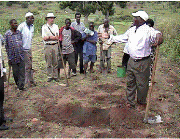
Tanzania
(MNN) — A learning exchange program has helped Tanzanian farmers learn from
farmers in Zambia.
Christian Reformed World Relief Committee's Steve Michmerhuizen says they're
partnered with a group that is teaching the concept of "water harvesting." Not a bad idea, considering this region is
prone to food shortages. Is it
successful? "Farmers work with a 100-kilo bag of grain as their measure.
They used to harvest two bags of grain per acre, but now they're up to 20.
This has proven to be a very effective method of enriching the soil and trapping the
water, making those two things–nutrients and water–available to the crop
the entire year while its growing."
In November 2006, Andrek Tembo, a farmer and partner with
CRWRC in Zambia, came to Tanzania to
share what had been working for farmers in his region. Tembo, Sengerema
Informal Sector Association (SISA) staff, and Michmerhuizen took a number of
Tanzanian farmers out to their fields and demonstrated conservation agriculture.
They dug a big deep hole, put a thick layer of dry leaves
and compost in the bottom, covered that layer with a good layer of manure, and
then filled the hole with soil. The intent is that when seeds are planted
in the soil, their roots will eventually find their way down to the rich
organic matter that holds rain water.
Though skeptical at first, word spread about the success of
the program, and by the beginning of the maize planting season, 379 farmers
living in three different areas decided to try it out.
What makes this work is that the farmers choose to be guided
through the water harvesting process rather than be carried, learning for
themselves. The women, too, are
involved. They prepare all the fields
each year. Now that the technique has proven successful in the region,
SISA will be leading some focused teaching in small groups to introduce the concept to the actual labor force.
They will also encourage families to try the technique with
other crops such as sorghum, millet, and beans to see how well it will work.
Michmerhuizen says with Christians partnering, they can
eventually share the simplicity of their faith.
"Their lives are very together with their land and their faith.
We're working with them to improve their life so that they would have a more
full life–a life more abundant. That is what Christ said we would have in
Him."
Their vision: to be a world where people experience and
extend Christ's compassion and live together in hope as God's community. The teams see this through by engaging God's
people in redeeming resources and developing gifts in collaborative activities
of love, mercy, justice, and compassion. Click here for more information on how
you can help.
